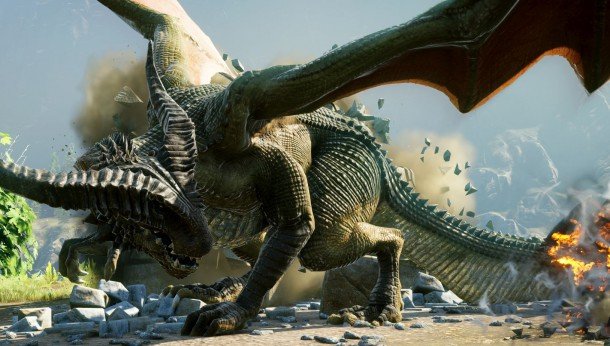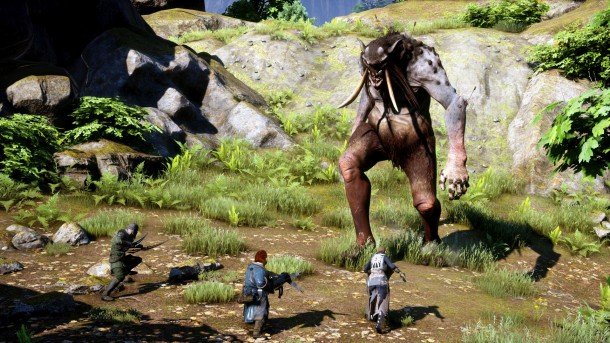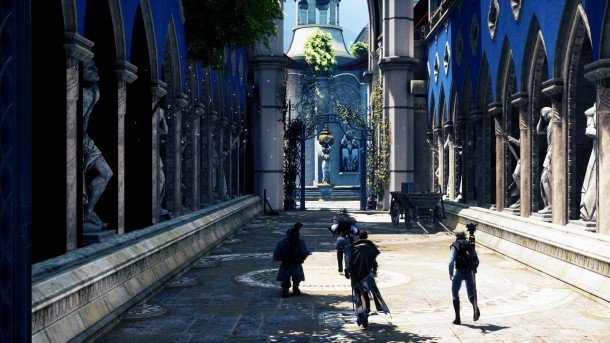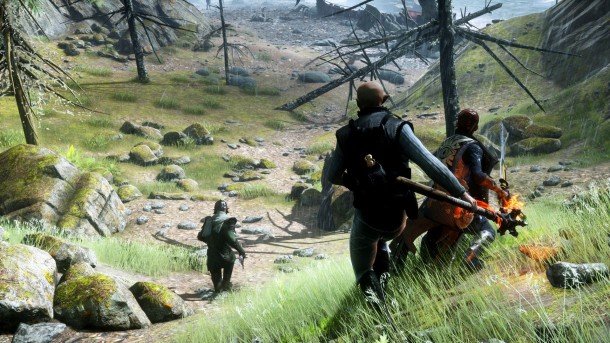Dragon Age: Inquisition interview - on fan feedback, romance, returning characters and the open world

The Dragon Age series has evolved in a tumultuous fashion since Origins. The switch from the world-threatening crisis of the first game to the personal stories of Dragon Age 2 proved too great a shift for some fans. Inquisition will again take the series to a grander stage. An open world with dynamic keep battles will bolster the central story, which sees inquisition—led by you—recruiting aid aid to postpone an imminent apocalypse.
How else will Inquisition differ from its predecessors? What have Bioware learned from fans of the series? How will they correct the awkward savegame bugs that could bring characters back to life, and how have they chosen your companions for the new adventure? Chris spoke to executive producer, Mark Darrah, to find out.
PC Gamer: What has creating this new protagonist, the inquisitor, given you the opportunity to do or change that you couldn't have with the warden, or with Hawke, or with a previous Dragon Age lead?
Mark Darrah: One of the reasons that we've decided to do that in the Dragon Age series is that it lets us explore a lot more themes. Hawke's story, it's not done, but the most important event of his life is essentially what's happening in Dragon Age 2. With the warden from Dragon Age: Origins he carries a lot of very divergent baggage. Anything from he could be dead to maybe there's a kid in the picture, maybe he's actually ruling Ferelden with Anora.
He's a very difficult character to proceed with because the universe is in very different places based on the events of the Dragon Age: Origins. Just reflecting those changes in the future games is a big challenge. To actually have him as a playable character is just—it would tie our hands too much. It would require us to make a story that was too constrained.
When we started this franchise, what we really wanted to always be doing was telling the story of the world, as opposed to the story of a single character. When we have a character, these events are big and world-shaking. We basically are trying to tell the story in the best way possible, rather than trying to have an arc for a single character.
PC Gamer: What is different about the inquisitor? In each case, the player puts a tremendous stamp on who they are. Hawke is not necessarily the warden. They have specific ways in which they have their own identity.
The biggest gaming news, reviews and hardware deals
Keep up to date with the most important stories and the best deals, as picked by the PC Gamer team.
Mark Darrah: Because we're going back to full races there's going to be a significant difference in background between the different potential inquisitors. In Dragon Age: Origins you are a member of the wardens, but in a lot of ways you are the last surviving warden or at least the last surviving warden on the ground when he's needed. I mean Alistair is there.
PC Gamer: Yes, apart from Alistair.
Mark Darrah: Apart from Alistair, who doesn't want to pick up the mantle for his own reasons.
PC Gamer: Sure, of course.

Mark Darrah: In Dragon Age 2 Hawke is really a leaf in the wind. The story is very much about him reacting to the world pushing on him. In this case it's much more about putting the inquisitor at the head of an organization that you're reestablishing. This isn't about being a Jedi, this is about founding the Jedi order.
You're definitely much more of an actor. You're the tip of the spear. You aren't waiting for the world to act upon you. You are acting upon it, both because you have an organization at your back. This gives you greater reach. You're not walking into a camp and begging for help. You're pounding down the gates of a castle and demanding that they come onto your side.
Also, surviving this calamity has actually given you powers that other people don't have. You have a remnant of this explosion in your hand that actually allows you to close these fade rifts that are around the world. This gives you additional influence on the world and additional ability to demand respect, demand that people listen to you, because you can do something no one else can. You can actually put a stop to this.
PC Gamer: It's a new direction for the narrative, but it sounds like there are a lot of echoes of who the warden is. You're still a part of an organization that's almost neutral, a third party to a lot of the conflicts in the world. Also, having something about yourself that allows you to interact with evil in a particular way.
Mark Darrah: Yes, that's a very good observation. In a lot of ways the inquisition is similar to the wardens in that way. Something stands apart or above the politics. It does what needs to be done to fix the world essentially. One of the overarching things of Dragon Age has always been that people do bad things, but for good reasons and that it takes someone outside of the situation to do good things in that situation.
Loghain in Dragon Age: Origins is someone who is doing something bad, but he's doing it because from his perspective it's the right thing to do. To him, Orlais is ultimately a bigger threat than the blight. He can't allow the Orlesians to come in to help. As the warden in Dragon Age: Origins, you're standing apart.
This is that taken to the next level. This is you. Everything is just too chaotic. There's a civil war mixing up Orlais. Someone needs to come in to do what needs to be done. In this case, more than in Dragon Age: Origins, there's the hints and the scent that there's a public master behind this. There's someone that's tugging on the string and maybe pushing the chaos a bit farther.

PC Gamer: Was the reasoning behind coming up with a new faction then so the players could maybe put their own spin on it and determine more about it? For example if you tried to tell this story starring a warden commander then you would be bound to that previous amount of the fiction that's already been established.
Mark Darrah: Yes, very much so. The wardens are—as we'll go into Inquisition to some degree—they have one purpose: to fight blights, To fight darkspawn, to fight blights to a fanatical degree. To this is their purpose, they will do nearly anything in order to do that.
We've established a lot of this and there's a certain amount of expectation set up from Dragon Age: Origins. We're not done with the wardens, but yes, they have limitations from how they can be used.
PC Gamer: Sure. I was going to ask, just to broaden the range a little bit, you guys have had a big presence at PAX. I wasn't there, but it was interesting to observe. Obviously, really substantial and a big substantial fan response to it as well. I guess two sides to that. One, why is that important to you and two, has it been useful now that you're going into the rest of development?
Mark Darrah: Yes, we did have a really big presence at PAX. We have a continuous presence. We have a base where we have a very much, a very personal connection to the fans. Then PAX Prime, last year we did a huge stage presence. It's been very helpful. It's very important from my perspective to keep in touch with our fans, to listen to their concerns, to stay in contact with them, to give them an opportunity to provide us with feedback.
The other thing that I think that this venue does is it gives them an opportunity to see us as people as well. We only have an opportunity to communicate electronically. It's very easy to see Bioware or any company as a single monolithic entity, that there are no people in there.
Trade shows, especially things like PAX which are very fan-focused, are very good for making that connection, directly, one on one with our fans. It's very important. We do take it back. It's very energizing for the developers with a huge presence at PAX PRIME, I think there was 30 people there from Bioware. It's just very good to see the response. I think to some degree it's very important for the devs to see the gamers as people as well and not the faceless masses on the forums.

PC Gamer: I was going to ask, how much you guys feel like you have to react to your fans, to what they want, and how much freedom you have to lead them in almost any regard, from the small decisions you're making to scoping out the future of the series and everything else?
Mark Darrah: It's a little bit of both. From a small feature perspective things like control schemes and the way that the narrative or the way that the conversation works and stuff like that, that's where we take a lot of feedback. That's where we're very much, I think people have a clear understanding of what they want and what they don't like.
The danger is most people, myself included, aren't perfectly objective when they're playing a game at the higher level. Henry Ford has a famous quote. If we asked people what they wanted they'd ask for a faster horse. There's a certain amount of truth to that.
Part of our job is to go out into the wilderness to go farther beyond what the players have seen, what they've played and essentially light a torch so they can see what could be and then hopefully they'll want what we're presenting. That can be uncomfortable. That can result in concern because obviously what they're comfortable with, what they've played before isn't completely what we're delivering.
In the case of Dragon Age: Inquisition I think there is a core there. I think there is a core Dragon Age game at its center. I think that comfort still remains, but we will be pushing you, we're challenging you with some new things.
PC Gamer: It's interesting, from an outsider's perspective, it always seems like Dragon Age undergoes quite a radical transformation game to game. That wasn't the case in Mass Effect, even though obviously things were improved and changed. The scope of the game maybe didn't change so dramatically. Why has that been the case do you think?
Mark Darrah: In a lot of ways Inquisition has been the game that we've really wanted to make from the beginning. From a systemic perspective Dragon Age 2 is actually very similar to Dragon Age: Origins. Its bones are the same, but we've put a very different outfit on top of it, for a lack of a better term.
Dragon Age 2, we decided we want to try something, to try to do very different storytelling, something much more personal, something much more tightly constrained. No chosen one, no clear overarching threat. I don't think it was a perfect success, but that was intentional.
A lot of the other changes that are perceived, the overall scope of the game or the perception of the combat getting a lot simpler or waves and things like that—not intended, exactly. That was supposed to be more evolutionary. I think we just overreached. We pushed too hard.
Because of Dragon Age 2, Dragon Age: Inquisition is having to be a lot more ambitious, to address those concerns and really try to get back much more to the roots of the franchise. Much more about tactical combat and a higher level of deliberate difficulty. More clear overall story, with the moral choices still in there, but much more in vein of Dragon Age: Origins style storytelling. You're right to ask. The goal wasn't to revolutionize the series every single time, but Dragon Age 2 forced our hand to a certain degree.
Joining in 2011, Chris made his start with PC Gamer turning beautiful trees into magazines, first as a writer and later as deputy editor. Once PCG's reluctant MMO champion , his discovery of Dota 2 in 2012 led him to much darker, stranger places. In 2015, Chris became the editor of PC Gamer Pro, overseeing our online coverage of competitive gaming and esports. He left in 2017, and can be now found making games and recording the Crate & Crowbar podcast.


